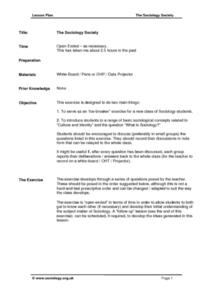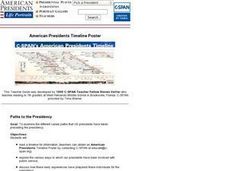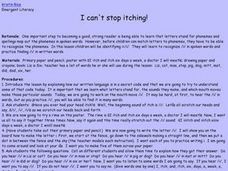Curated OER
Arkansas Black Pioneers: A History of African-American Colonies in Arkansas
Students research regions of early Arkansas as they relate to African American colonies in Arkansas after the Civil War. They discuss the characteristics of the regions, view a Powerpoint presentation, and write reflective journals.
Curated OER
Painting a Rainbow
First graders discuss the story of Noah an the Rainbow. They then open Appleworks 5 to select painting and pencil and practice drawing lines to make a rainbow. They use pencil to print their name and type or print a promise on the page...
Curated OER
Language Arts: Understanding Phonemes
Students discover the relationship between letters and phonemes. The teacher leads an oral demonstration of pronunciation and focus on the /a/ sound. Next, students examine a series of pictures, circling the ones where they hear the...
Curated OER
Ah Ah Ah! Don't Do That!
Young scholars become familiar with the alphabetic principle that letters stand for phonemes and spellings map out the phonemes in spoken words. They focus on identifying the short /o/ sound in spoken words and the tongue twister "Oscar...
Curated OER
When You Don't Get What You Want
Students recognize the short vowel u in written and spoken language. Through matching activities, they discriminate the short vowel /u/ from other phonemes. Students associate the phoneme with its letter representation and identify the...
Curated OER
The Sociology Society
Sixth graders discuss the meaning of sociology. In this advanced lesson, 6th graders are led by discussion to learn the main concepts of sociology and get to know others better.
Curated OER
Animal Electronic I.D.
Students discover ways to keep the animals in our environment safe by examining electronic I.D. tags. For this animal safety lesson, students participate in a role-playing activity in which they are monitored by an electronic I.D....
Curated OER
Heating
Learners develop the idea that heat is a form of energy which moves from hot objects to cold ones.
Curated OER
Paths to the Presidency
Seventh graders investigate a timeline of the career paths that US presidents took before they became the president. They how these career choices prepared these men for the presidency.
Curated OER
PBS Kids Go Buster Buffalo Round-Up
Second graders visit Rapid City, South Dakota, and Jackson Hole, Wyoming in these two episodes of Buster. They examine the Lakota people in South Dakota to see what it means to persevere. They sing songs and study idioms. They brainstorm...
Curated OER
Find the Rocks
Students gain appreciation about the geology around them. They navigate the schoolyard using a map. They create a list of what people use rocks for. They mark location of rocks on their maps.
Curated OER
Learning Festival ~ Book Buddies Visit High School
Young scholars work together to develop a festival for book lovers. High schoolers work with young children and practice their reading. Traveling between reading stations, they focus on different reading standards. They act as...
Curated OER
Marbles
Students act out the start of the given problem. They then brainstorm for ways to solve the problem and share solutions to the problem by identifying and continuing a repeating number pattern.
Curated OER
Using A Winogradsky Column to Analyze Microbial Communities
Students use easily obtained materials to study ecological succession in a microbiological community. They collect water samples from outdoor sources in plastic bottles to observe and record changes.
Curated OER
Everybody Needs a Rock
Second graders examine science non-fiction books in the 500 section of the media center. They listen to Byrd Baylor's, Everybody Needs a Rock, and write a sentence that tells why everyone does need a rock. They illustrate the sentence.
Curated OER
Line Graphs
Seventh graders create a line graph and identify when to use line graphs. In this line graphs instructional activity, 7th graders analyze the average temperatures of various cities. Students graph the data they collected.
Curated OER
Say What?
Students explore phonemes in spoken words. They discuss the /e/ (short e) correspondence. Students read "Red Gets Fed." They learn a meaningful letter symbol for the /e/. Students identify /e/ sound in both spoken and written words.
Curated OER
I Am Tired
First graders recognize the short vowel o in written and spoken language. Through listening and matching activities, they discriminate the vowel sound /o/ from other phonemes. Students associate the phoneme with its letter representation...
Curated OER
A Punch in the Gut
Students recognize /u/ in spoken words by observing a meaningful representation and a letter symbol. They then practice finding /u/ in words. They listen to the story "Fuzz and the Buzz" and identify the words they hear with the /u/.
Curated OER
Bubbly Bs and Dull Ds
Students practice discerning between the letters D and B. Through hands on activities, they recognize the difference between the commonly confused letters B and D. They practice writing both letters and correcting common mistakes and...
Curated OER
I Can't Stop Itching
Students recognize the short vowel i in written and spoken language. Through matching and listening activities, they discriminate the vowel sound /i/ from other phonemes. After reading the story "Liz is Six," students draw a picture with...
Curated OER
Listen to the Pin Drop
Students practice reading silently. The class discusses the benefits of reading silently and several methods for reading silently, including cross checking and chunking. Working in groups, they silently read a leveled text and discuss...
Curated OER
In The News
Students investigate the life of Amelia Earhart and conduct research using a variety of resources including Scholastic.com. Then they take the information and write a newspaper article. The entire process of writing is completed...
Curated OER
Behavior Code
Students develop codes to guide individual actions and responsibilities as members of the team. They explore memories, journal entries, etc. about
about teamwork. Through prompting questions, they translate these into a
draft behavior...























